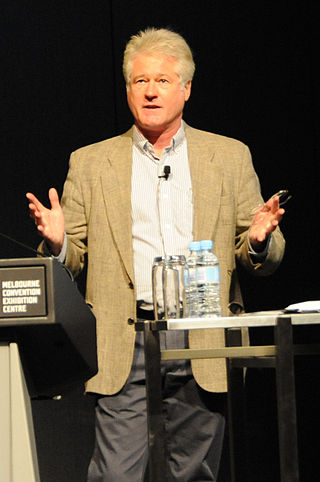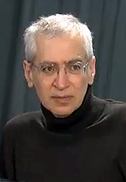Related Research Articles
A utopia typically describes an imaginary community or society that possesses highly desirable or near-perfect qualities for its members. It was coined by Sir Thomas More for his 1516 book Utopia, which describes a fictional island society in the New World.

The canon of a work of fiction is "the body of works taking place in a particular fictional world that are widely considered to be official or authoritative; [especially] those created by the original author or developer of the world". Canon is contrasted with, or used as the basis for, works of fan fiction and other derivative works.
"Kir'Shara" is the ninth episode of the fourth season of the American science fiction television series Star Trek: Enterprise. It was writer Michael Sussman's third episode of the season, while it was director David Livingston's second. The episode was the third in a three-part story arc, following on from the episodes "The Forge" and "Awakening". The title "Kir'Shara" refers to a Vulcan religious relic, and the three part Vulcan story arc explored themes relating to the Protestant Reformation resulting in comparisons to books such as The Da Vinci Code and The Celestine Prophecy, while the Kir'Shara itself was compared to the Nag Hammadi library.
John Shelton Lawrence is an emeritus professor of philosophy at Morningside College in Sioux City, Iowa, United States. His initial major publication, The American Monomyth, written with Robert Jewett, was published in 1977.

Russell Blackford is an Australian writer, philosopher, and literary critic.

Space Western is a subgenre of science fiction that uses the themes and tropes of Westerns within science-fiction stories in an outer space setting. Subtle influences may include exploration of new, lawless frontiers, while more overt influences may feature actual cowboys in outer space who use rayguns and ride robotic horses. Although initially popular, a strong backlash against perceived hack writing caused the genre to become a subtler influence until the 1980s, when it regained popularity. A further critical reappraisal occurred during the 2000s due to critical acclaim for Firefly.
Daphne Patai is an American scholar and author. She is professor emeritus of the Department of Languages, Literatures, and Cultures at the University of Massachusetts Amherst. Her PhD is in Brazilian literature, but her early work also focused on utopian and dystopian fiction. She is the daughter of the anthropologist Raphael Patai.
Science fiction studies is the common name for the academic discipline that studies and researches the history, culture, and works of science fiction and, more broadly, speculative fiction.

Star Trek and Star Wars are American media franchises which present alternative scenarios of space adventure. The two franchises proliferate in this setting of storytelling, and each has offered various forms of media productions for decades. Each franchise comprises billions of dollars of intellectual property, employment for thousands, and entertainment for many more.
Star Trek is an American science fiction media franchise created by Gene Roddenberry, which began with the eponymous 1960s television series and became a worldwide pop-culture phenomenon. Since its creation, the franchise has expanded into various films, television series, video games, novels, and comic books, and it has become one of the most recognizable and highest-grossing media franchises of all time.
Claude J. Summers is an American literary scholar, and the William E. Stirton Professor Emeritus in the Humanities and Professor Emeritus of English at the University of Michigan-Dearborn. A native of Galvez, Louisiana, he was the third child of Burg Martin Summers and Theo Coy Causey. He was educated in the public schools of Ascension Parish, graduating from Gonzales High School in 1962. He has long credited two teachers at Gonzales High School—Diana Sevario Welch and Sherry Rushing—for inspiring his interest in academic achievement.

Alan N. Shapiro is an American science fiction and media theorist. He is a lecturer and essayist in the fields of science fiction studies, media theory, posthumanism, French philosophy, creative coding, technological art, sociology of culture, social choreography, software theory, robotics, artificial intelligence, and futuristic and transdisciplinary design. Shapiro's book and other published writings on Star Trek have contributed to a change in public perception about the importance of Star Trek for contemporary culture. His published essays on Jean Baudrillard - especially in the International Journal of Baudrillard Studies - have contributed to a change in public perception about the importance of Baudrillard's work for culture, philosophy, sociology, and design.

William G. Doty (1939–2017) was an American religious studies scholar and educator. He is an author and editor known for his writings about myth and mythology.
Phillip E. Wegner is a professor in the Department of English and the Marston-Milbauer Eminent Scholar in English at the University of Florida.

Star Trek Lives! is a 1975 book, co-written by Jacqueline Lichtenberg, Sondra Marshak, and Joan Winston, which explored the relationship between the Star Trek television series and the fandom that emerged following the series' cancellation. It was published by Bantam Books.

Textual Poachers: Television Fans & Participatory Culture is a nonfiction book of academic scholarship written in 1992 by television and media studies scholar Henry Jenkins. Textual Poachers explores fan culture and examines fans' social and cultural impacts.

Francesca Coppa is an American scholar whose research has encompassed British drama, performance studies and fan studies. In English literature, she is known for her work on the British writer Joe Orton; she edited several of his early novels and plays for their first publication in 1998–99, more than thirty years after his murder, and compiled an essay collection, Joe Orton: A Casebook (2003). She has also published on Oscar Wilde. In the fan-studies field, Coppa is known for documenting the history of media fandom and, in particular, of fanvids, a type of fan-made video. She co-founded the Organization for Transformative Works in 2007, originated the idea of interpreting fan fiction as performance, and in 2017, published the first collection of fan fiction designed for teaching purposes. As of 2021, Coppa is a professor of English at Muhlenberg College, Pennsylvania.
Fan studies is an academic discipline that analyses fans, fandoms, fan cultures and fan activities, including fanworks. It is an interdisciplinary field located at the intersection of the humanities and social sciences, which emerged in the early 1990s as a separate discipline, and draws particularly on audience studies and cultural studies.
References
- ↑ "Book information". Archived from the original on 3 March 2016. Retrieved 24 September 2017.
- ↑ "McFarland - a leading independent publisher of academic and nonfiction books". www.mcfarlandbooks.com. Archived from the original on 10 May 2017. Retrieved 24 September 2017.
- ↑ "McFarland - a leading independent publisher of academic and nonfiction books". www.mcfarlandbooks.com. Archived from the original on 10 May 2017. Retrieved 24 September 2017.
- ↑ "The Fantastic Made Visible". Archived from the original on 11 February 2016. Retrieved 24 September 2017.
- ↑ "Digital Games and the Simulation of History" . Retrieved 24 September 2017.
- ↑ "The Play Versus Story Divide in Game Studies". Archived from the original on 10 May 2017. Retrieved 24 September 2017.